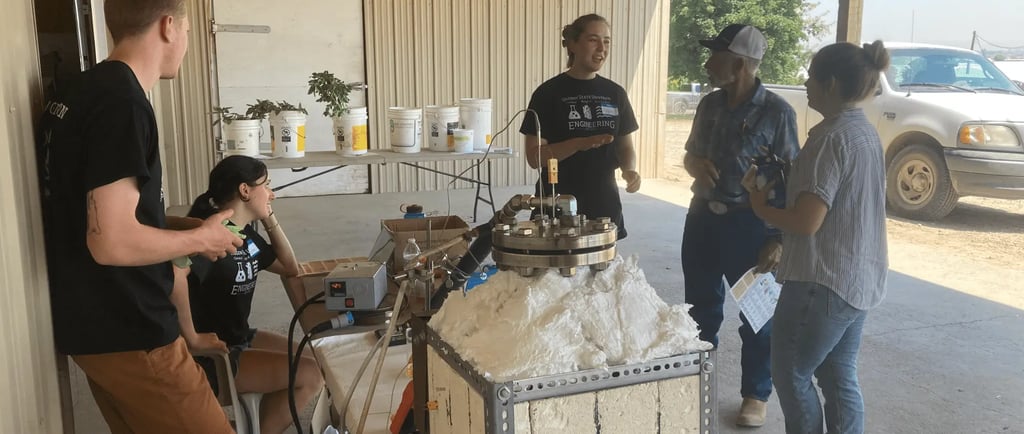Oregon State University Collaborates with Onion Growers to Reduce Plastic Waste
Oregon State University partners with onion growers to turn plastic waste from drip irrigation into diesel fuel, offering an eco-friendly solution to plastic pollution in agriculture.
FRESH PRODUCE


Rochefort’s students demonstrated the technology for local growers at Malheur Experiment Station Field Day on July 10. (Image Credit: Luke Randall)
Malheur County, Oregon, August 2024 – Oregon State University (OSU) has embarked on an innovative project with onion growers in Malheur County to address the growing problem of plastic waste caused by drip irrigation systems. Each year, drip tape irrigation, a method commonly used by onion farmers, produces about two million pounds of plastic waste. This waste is difficult to recycle and often ends up in landfills or is stored indefinitely on farms. Recognizing this issue, Oregon State University researchers have developed a promising solution that aims to both reduce plastic waste and benefit agricultural operations.
The Problem of Drip Tape Waste
Drip irrigation systems have become popular in onion farming due to their efficiency in water usage, which is crucial in regions like Malheur County where water resources are often limited. However, the thin plastic tape used in these systems, known as drip tape, presents a significant waste disposal challenge. Many landfills are unwilling to accept drip tape, and recycling facilities are generally unable to process it. As a result, farms are left with large quantities of plastic waste that have no viable disposal options.
Stuart Reitz, director of Oregon State University’s Malheur Experiment Station, noted that plastic pollution from drip tape has been a persistent and growing concern. Onion farmer Craig Yano, who has been using drip irrigation on his 800-acre farm for 20 years, added, "There are a lot of advantages to drip irrigation, but the waste is a major drawback." Without alternative solutions, farms must either pay to transport the waste to distant landfills or store it on-site, which creates additional problems.
Pyrolysis: Turning Plastic into Fuel
In collaboration with OSU’s Chemical Engineering faculty, researchers have developed a potential solution to the plastic waste issue using a process known as pyrolysis. Pyrolysis involves heating plastic materials to extremely high temperatures in the absence of oxygen, which breaks them down into usable byproducts, including diesel fuel. This fuel can then be used to power farm machinery, creating a circular system where farm waste is converted into a resource.
Dr. Skip Rochefort, an Oregon State University (OSU) chemical engineering professor, and his team have been exploring pyrolysis as a method for reducing plastic waste for several years. “We can put almost any type of plastic into the pyrolysis reactor and turn it into diesel fuel,” Rochefort explained. He and his students have already successfully converted various types of plastic, including milk jugs and syringes, into usable fuel.
This groundbreaking approach has the potential to solve two problems simultaneously: it reduces the environmental impact of plastic waste and provides an alternative fuel source for farmers. Pyrolysis is also relatively robust, making it suitable for use in agricultural settings where dirt and other contaminants are common.
Piloting the Solution with Local Farmers
To bring this solution to the field, Oregon State University (OSU) researchers, including Rochefort, Reitz, and Lucas Ellis, have secured a $25,000 transdisciplinary seed grant to pilot the pyrolysis project with local onion farmers. Yano and four other farmers in Malheur County have volunteered to host pyrolysis units on their farms. These small-scale units will be tested to determine their efficiency and usability in a real-world farming environment.
While the pyrolysis technology shows great promise, there are still some challenges to overcome. One key issue is ensuring that the units are simple and safe enough for farm workers to operate. Additionally, researchers will need to test the quality of the diesel fuel produced to ensure it is suitable for use in agricultural machinery.
Despite these hurdles, farmers are optimistic about the potential of this technology. At a recent demonstration of the pyrolysis process held during the Malheur Experiment Station Field Day, growers were impressed with the possibilities. “A grower came up to me and said, ‘Why the heck did we not know about this before?’ They were just very excited that it was an option,” Reitz said.
A Sustainable Future for Onion Farming
This collaboration between Oregon State University (OSU) and local onion growers highlights the importance of innovative, research-driven solutions to address environmental challenges in agriculture. If successful, the pyrolysis technology could be expanded beyond onion farming to other sectors of agriculture that also struggle with plastic waste. By turning waste into fuel, OSU’s project offers a sustainable path forward for both farmers and the environment.
“We are just at the beginning,” Rochefort said, “but we are confident that with further research and collaboration, this technology can make a real impact on reducing plastic waste and providing an alternative fuel source for farmers.”
This pioneering work represents a significant step toward creating a more sustainable agricultural system in Malheur County and potentially across the entire farming industry.
For more details visit https://extension.oregonstate.edu
